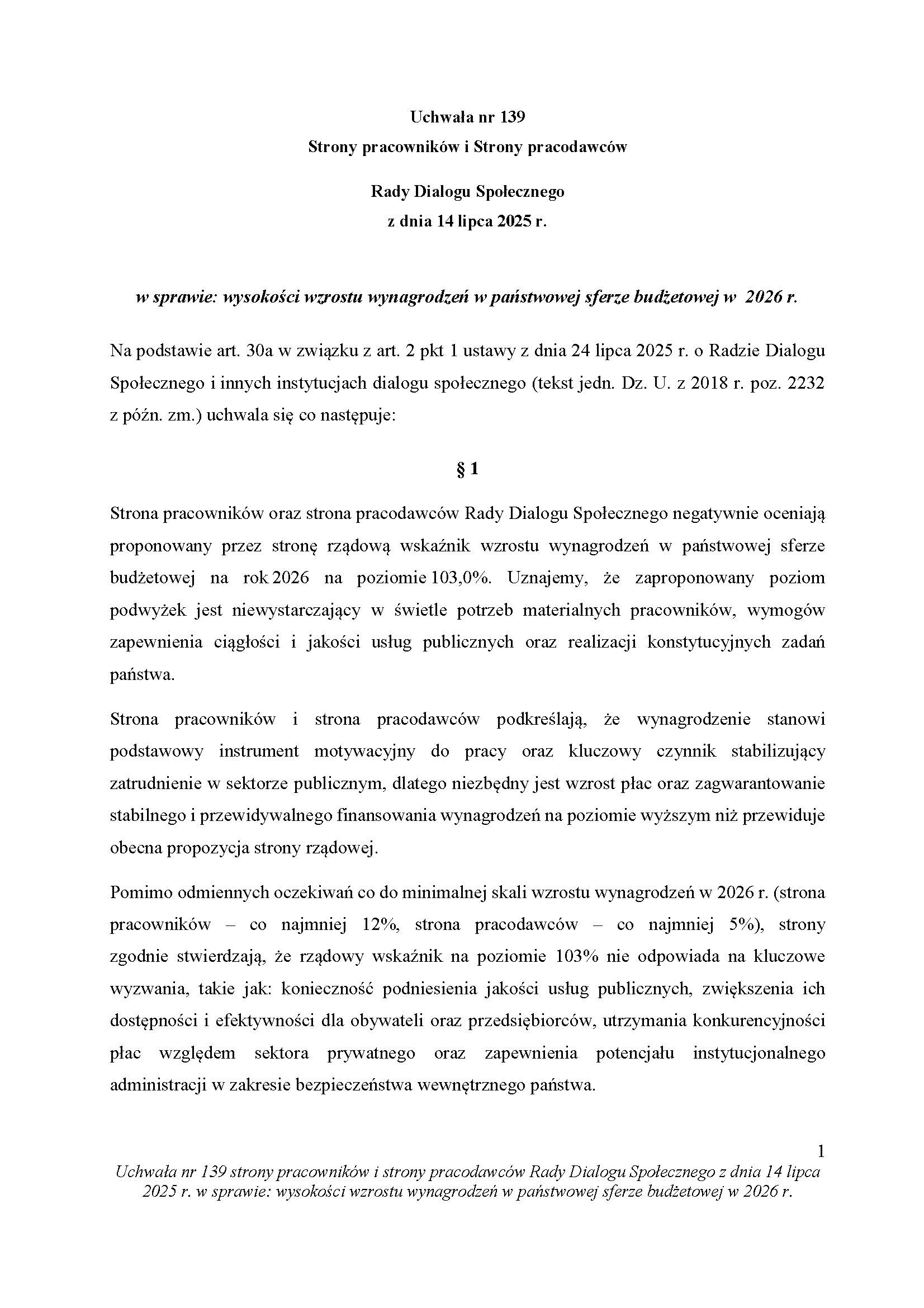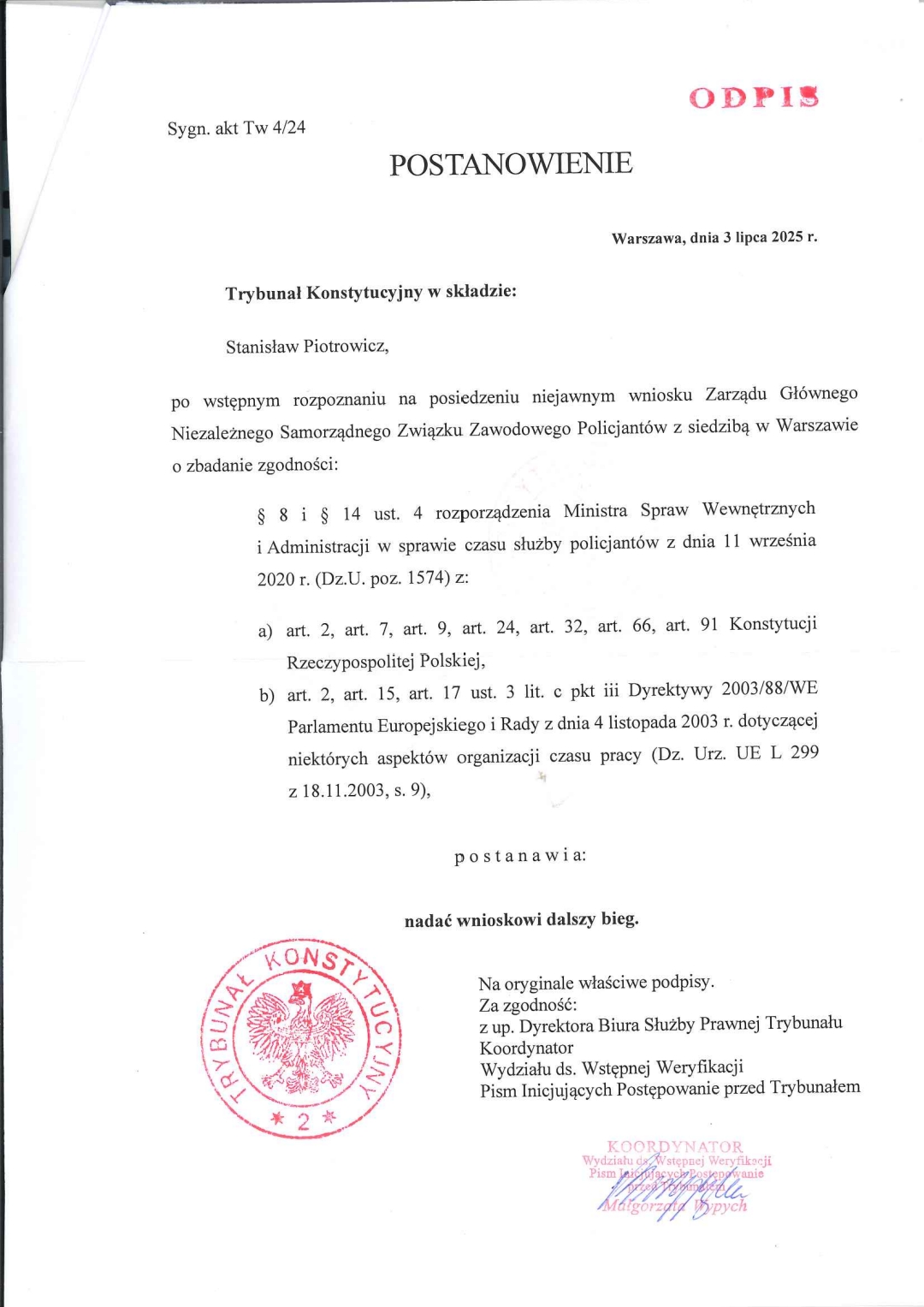
The MAHA Priority Pursued By Lawmakers On Both Sides Of The Aisle
Authored by Nathan Worcester via The Epoch Times (emphasis ours),
WASHINGTON—The Make America Healthy Again (MAHA) agenda has helped shape the second Trump administration, with early actions targeting mercury in vaccines, artificial food dyes, and ultra-processed foods.
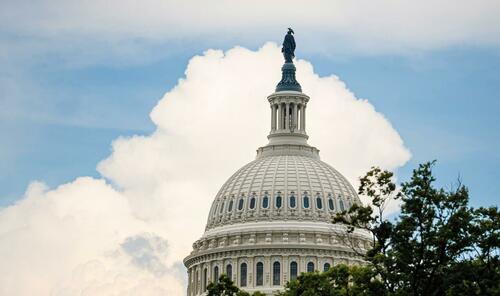 The U.S. Capitol in Washington on July 14, 2025. Despite the Supreme Court’s 2002 ruling in favor of drug advertising, some lawmakers are seeking to ban the practice. Madalina Kilroy/The Epoch Times
The U.S. Capitol in Washington on July 14, 2025. Despite the Supreme Court’s 2002 ruling in favor of drug advertising, some lawmakers are seeking to ban the practice. Madalina Kilroy/The Epoch TimesThat’s thanks in large part to Health Secretary Robert F. Kennedy Jr., who dropped out of the presidential race in August 2024 and joined forces with then-presidential candidate and former President Donald Trump.
Kennedy stressed one notable MAHA agenda item just two days before Election Day.
On Nov. 3, 2024, he asked voters to support Trump “so we can ban pharmaceutical advertising”—such as the commercials for brand-name drugs that pepper many networks.
The United States consumes more prescription drugs than any country in the world and spends nearly twice as much for them as all other nations combined, according to a Rand report.
For now, independent and Democratic senators are leading the legislative charge to eliminate direct-to-consumer drug ads, including on social media, with House Democrats following with a parallel bill.
Sen. Josh Hawley (R-Mo.) has voiced openness to his Senate colleagues’ proposal. The Missourian is also part of a bipartisan effort to get rid of tax deductions drug companies use for promotions.
Though some legislators are enthusiastic, past court decisions might throw up roadblocks—any sturdy leash on Big Pharma’s marketing could get tangled on the First Amendment.
MAHA Versus Commercial Speech
Critics of direct-to-consumer drug advertising, including Kennedy, have long pointed out that the practice is rare around the world. It is only allowed in the United States and New Zealand.
In May, the MAHA Commission released a report on childhood chronic disease that raised concerns about pharmaceutical ad campaigns aimed at everyday Americans. It suggested they encourage “a notable level of reliance on the industry by those that benefit financially.”
The report also highlighted medical publications that have linked those advertisements to the over-diagnosis of disease and the overuse of drugs, including by children.
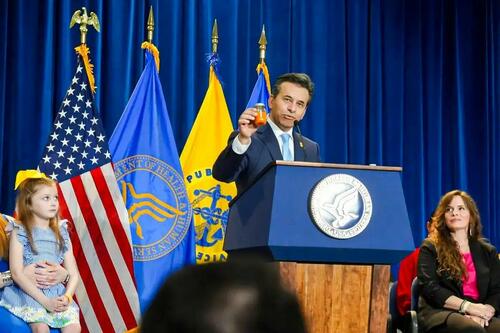 Food and Drug Administration Commissioner Dr. Marty Makary holds up carrot juice, an alternative to synthetic food dyes, in Washington on April 22, 2025. Nathan Worcester/The Epoch Times
Food and Drug Administration Commissioner Dr. Marty Makary holds up carrot juice, an alternative to synthetic food dyes, in Washington on April 22, 2025. Nathan Worcester/The Epoch TimesBy 2023, Americans were consuming more than 210 billion daily doses of medication, data from analytics company IQVIA show.
Dr. Marty Makary, the commissioner of the Food and Drug Administration, said in April that “we don’t have any plans to ban direct-to-consumer advertising.”
“There are some things we can do to make sure that the information being presented is a complete picture,” he added.
Legal precedent could make it difficult to eliminate such advertisements. Corporations, including drug companies, have wide latitude for commercial speech in the United States.
In 2002, the Supreme Court ruled that a federal law restricting advertisements for certain drugs ran afoul of the First Amendment.
About a decade later, it struck down a Vermont law banning the sale of prescription drug users’ data for drug marketing, again on free speech grounds.
Sanders, King, Shaheen, and Hawley
Despite the Supreme Court’s record, some lawmakers want to bring the issue to a head.
In June, Sens. Bernie Sanders (I-Vt.) and Angus King (I-Maine), independents who caucus with the Democrats, unveiled the End Prescription Drug Ads Now Act.
The measure would alter the Federal Food, Drug, and Cosmetic Act to define all direct-to-consumer advertising as misbranding, thereby banning it.
“This bill is a great step to ensure that patients are getting the best information possible and from the right source: their providers and not biased advertisements,” King said in a statement on the bill.
The senators attracted five Democrats as cosponsors: Sens. Tammy Duckworth (D-Ill.), Peter Welch (D-Vt.), Dick Durbin (D-Ill.), Jeff Merkley (D-Ore.), and Chris Murphy (D-Conn.).
It is now in the Senate’s health committee, where Sanders is the ranking member. Sanders’ office did not respond to requests for comment by publication time.
On July 21, King told The Epoch Times he was unaware of any Republicans in the Senate who supported the proposal.
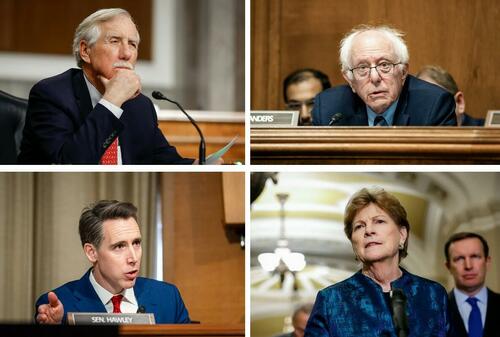 (Top Left) Sen. Angus King (I-Maine) listens to testimony on Capitol Hill in Washington on April 27, 2022. King and Sen. Bernie Sanders (I-Vt.) introduced the End Prescription Drug Ads Now Act to classify all direct-to-consumer drug ads as misbranding, effectively banning them. (Top Right) Sen. Bernie Sanders (I-Vt.) speaks during a hearing on Capitol Hill in Washington on May 14, 2025. (Bottom Left) Sen. Josh Hawley (R-Miss.) speaks during a confirmation hearing on Capitol Hill in Washington on Feb. 13, 2025. (Bottom Right) Sen. Jeanne Shaheen (D-N.H.) speaks at a news conference at the U.S. Capitol on Sept. 19, 2023. In May, Hawley and Shaheen introduced the No Handouts for Drug Advertisements Act. Chip Somodevilla/Getty Images, Madalina Vasiliu/The Epoch Times, Anna Moneymaker/Getty Images
(Top Left) Sen. Angus King (I-Maine) listens to testimony on Capitol Hill in Washington on April 27, 2022. King and Sen. Bernie Sanders (I-Vt.) introduced the End Prescription Drug Ads Now Act to classify all direct-to-consumer drug ads as misbranding, effectively banning them. (Top Right) Sen. Bernie Sanders (I-Vt.) speaks during a hearing on Capitol Hill in Washington on May 14, 2025. (Bottom Left) Sen. Josh Hawley (R-Miss.) speaks during a confirmation hearing on Capitol Hill in Washington on Feb. 13, 2025. (Bottom Right) Sen. Jeanne Shaheen (D-N.H.) speaks at a news conference at the U.S. Capitol on Sept. 19, 2023. In May, Hawley and Shaheen introduced the No Handouts for Drug Advertisements Act. Chip Somodevilla/Getty Images, Madalina Vasiliu/The Epoch Times, Anna Moneymaker/Getty ImagesThat same day, Hawley, a Republican who has carved out a reputation as an economic populist, said he was receptive to the bill.
“I haven’t read Bernie’s bill, but it sounds very complementary to me,” he told The Epoch Times.
He suggested that it paired well with one of his own bills, one that targets pharmaceutical ads in a way that Kennedy has also highlighted.
In May, Hawley and Sen. Jeanne Shaheen (D-N.H.) introduced the No Handouts for Drug Advertisements Act.
Under current law, drug companies can claim tax deductions for ads for both compounded medications—drugs combined or otherwise customized to individual patients—and prescription drugs. Hawley and Shaheen’s proposal would make that impossible.
“HHS Secretary RFK Jr. has made it clear that he wants to ban prescription drug commercials, and I’m proud to introduce legislation to do just that,” Hawley said in a statement on the bill.
Like Sanders and King’s bill, it is awaiting action in a committee—in this case, the Committee on Finance.
Interest Grows in the House
Rep. Greg Murphy (R-N.C.), a medical doctor, introduced a House version of Hawley and Shaheen’s bill in April. It, too, was referred to that chamber’s finance committee.
Read the rest here…
Tyler Durden
Tue, 07/29/2025 – 17:40














